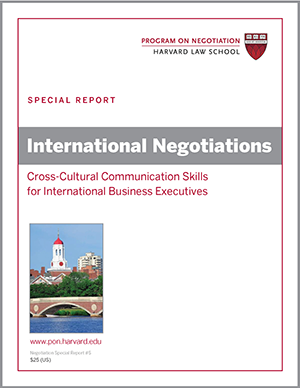
On February 19, U.K. prime minister David Cameron announced he had struck a deal in an international negotiation with the rest of the European Union (EU) to amend Britain’s role within the union.
Cameron hoped the new deal terms would be sufficient to convince Britons to vote in a June referendum to keep their nation within the EU. Many in Britain, concerned that economic threats and the EU migrant crisis have unfairly burdened their nation within the EU, have pushed for Britain to exit the union.
Yet many economists believe a British departure from the EU, or “Brexit,” would be damaging both to the United Kingdom and the rest of Europe. A Brexit could lead to a new referendum on whether Scotland will remain in the EU—and ultimately in the U.K. It would also require Britain and the EU to renegotiate their trade relationship, as well as shaking up ties with the United States and other nations.
In the complex realm of international negotiation, parties face numerous challenges, including multiple parties, cross-cultural issues, and opposition their constituents. When negotiating with the EU, Cameron used several diplomatic negotiation techniques to ensure that talks went his way.
Britain’s leading edge
Emboldened by his decisive reelection in May 2015, Cameron began visiting EU member states—ultimately, 20 of them—to lay the groundwork for a more formal international negotiation.
Over the course of months of backroom talks, EU representatives hammered out an agreement with Britain, which was widely perceived to be the more powerful party at the table. With the threat of a forthcoming British referendum hanging over its head, the EU had a strong motivation to give Cameron whatever he felt was necessary to convince British voters that departing the EU would be unwise. Not only was a British departure expected to strike a significant blow to the EU, but it carried the risk of “setting off an unstoppable rush for the exit,” according to Reuters.
Three commitments on the negotiation agenda were relatively easy for the EU to grant. These key terms were included in the draft agreement announced by Cameron, the Associated Press reports:
1. Economic protections. In the international negotiation, Britain secured a number of safeguards for itself and for the other eight EU nations that don’t use the euro single currency.
2. A symbolic distance. Cameron negotiated for the United Kingdom to be excluded from official references to the EU’s goal of building a European “super state.”
3. Less red tape. EU leaders agreed to improve regulation by lowering taxes and bureaucratic hurdles for small- and medium-sized businesses.
A thornier issue
More difficult to grant was Cameron’s demands of cutting welfare benefits for migrant workers arriving in Britain from other parts of Europe. The demand was hard to square with EU rights guaranteeing free movement and non-discrimination of European citizens, Reuters reports.
Ultimately, the negotiators decided to leak to the press the idea of an “emergency brake” that would allow Britain the right to deny benefits to incoming EU workers for their first four years in the country.
At a two-day summit with other European leaders in December, Cameron “delivered a bravura performance over dinner” that convinced them that Britain’s problems were ultimately also their own, according to Reuters. Notably, in previous months, Cameron had primed many of them during his jet-setting from one capitol to the next.
Having persuaded his fellow leaders in Europe to largely agree to his demands, Cameron now faces the daunting task of selling the deal to his Conservative Party, his ministers, the press, and his people. At this writing, most polls showed the public favoring remaining in the EU, but by a slim margin.
Succeeding in international negotiation
The negotiations between Britain and the EU highlight the following advice for professional negotiators, particularly those involved in international business negotiations:
1. Consider your BATNA—and theirs. In both domestic and international negotiation, your most important source of power is typically your best alternative to a negotiated agreement, or BATNA. A strong BATNA allows you to feel comfortable walking away from a disappointing deal. The best negotiators take time to analyze not only their own but also the other party’s BATNA. Understanding that the prospect of a Brexit was enormously unappealing to the EU, Cameron and his team felt confident that EU negotiators would bend over backwards to grant many of their demands in the international negotiation—as proved to be the case.
2. Lay the groundwork early. Rather than waiting for the formal international negotiation to begin, Cameron began lobbying other EU leaders months in advance to support his overall cause and specific demands. By the time negotiators were gathered around the negotiating table, key terms had already been decided. Manage the complexity of international negotiation by reaching out to key partners and starting talks early.
3. Include “easy” issues in the discussion. To instill optimism in a complex international negotiation, include concessions that are relatively easy for you to grant on your negotiation agenda. The EU, for example, had little to lose from promising to exclude Britain from rhetoric about building a European super-state. You may also be able to trade a concession on a relatively symbolic issue for a concession from your counterpart on an issue you value more.





